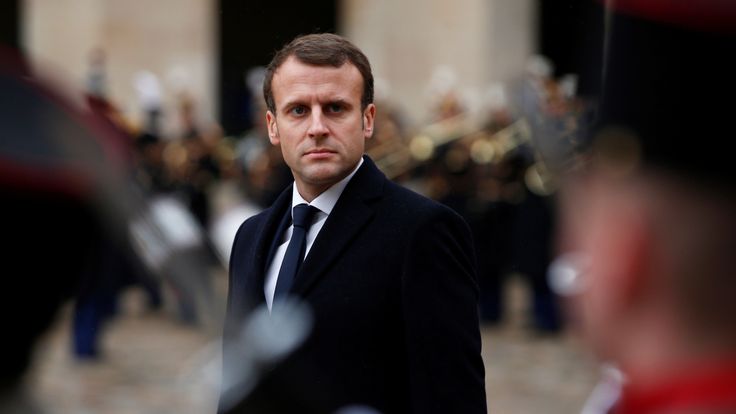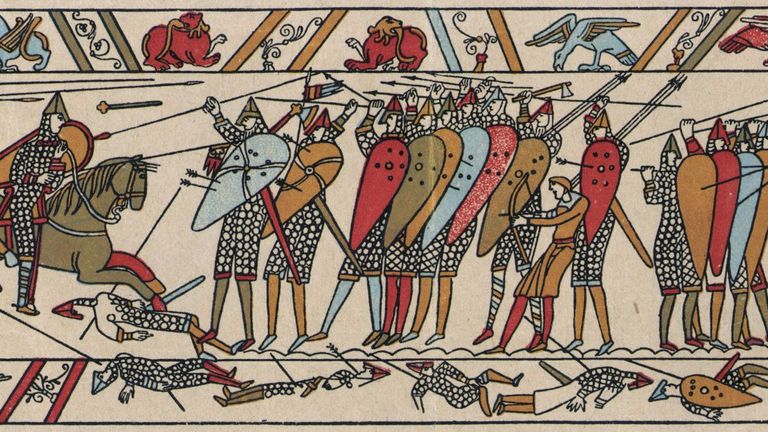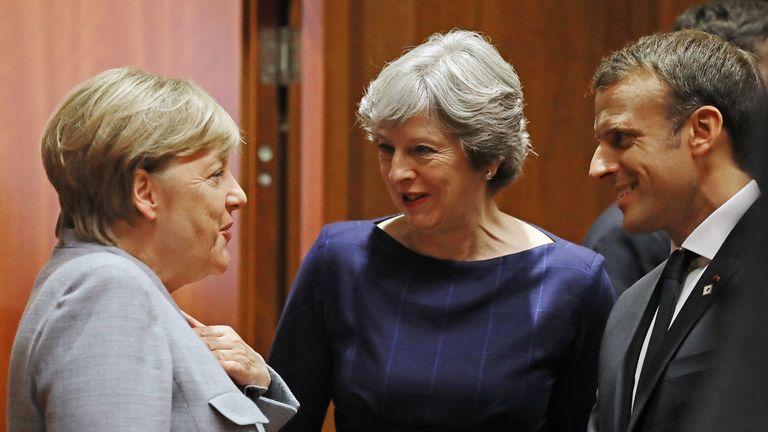Sky Views: Loaning the Bayeux tapestry is a smart move by Macron-the-Smooth

Thursday 18 January 2018 02:58, UK
Alistair Bunkall, Defence Correspondent
There was a time when the very presence of a French leader in England would have been cause for war.
These days they just cross the Channel bearing gifts to remind Britain of that.
In the Bayeux Tapestry William the Conqueror is depicted wielding a mace; today Macron-the-Smooth will be armed only with charm and the lofty offer of 11th century needlework. Relations between England and France have come a long way in 950 years.
Macron's offer to loan the Bayeux Tapestry is a smart move by a President whose silky diplomacy is fast making him an international player.
President Trump got a military parade and the full cordon bleu treatment at the top of the Eiffel Tower, President Xi was given a horse called Vesuvius and President Putin was suitably impressed by his invitation to Versailles.
Macron has visited Africa five times since becoming President in May 2017 - the continent was last graced by a British Prime Minister in 2013. No coincidence the word diplomacy is derived from 18th century French.
The Bayeux Tapestry doesn't come without strings attached. In return for the privilege of borrowing this 70 metre long depiction of French victory over the English enemy, Macron has asked Theresa May for military support to France's modern-day foreign adventures.
In the spirit of entente, the Prime Minister has agreed to contribute three Chinook helicopters to help the French mission in Africa's Sahel region and in return Macron will send more French troops to the British led NATO mission in Estonia.
With May distracted by Brexit and Merkel tied up trying to form a government in Germany, Macron sees a chance to become the central leader of Europe.
Key to his ambition is the creation of an established EU military command. In a speech at the Sorbonne last September the French leader outlined proposals for a 'European Intervention Initiative' - he described it as a "common intervention force" that would "better integrate our armed forces at every stage". To cut through the political phraseology, Macron wants a European military unit that could be used to intervene in foreign crises.
To Britain, this will sound too much like the beginnings of an EU Army.
Britain believes NATO is, and should remain, the single military alliance for Europe. Anything else risks duplication and dilution.
But with Britain soon to leave the EU, and thereby its veto rights, Macron is seizing his opportunity. The 40-year-old wants a European military force with France at its centre.
It has long annoyed defence officials in Paris that Britain has hogged the position of Deputy Supreme Allied Commander of NATO. In the months after the EU referendum, there were rumours the French were lobbying to grab that privilege for themselves - it was a non-starter because NATO is an entirely separate organisation.
In recent years, the French have been the more interventionist of the two. Nicolas Sarkozy drove support for the international mission in Libya and Francois Hollande sent French forces into Mali and the Central African Republic - Washington has been impressed.
Contrastingly, although Britain meets its NATO obligation of spending 2% GDP on defence, which France doesn't, the past decade has been one of decline for the UK's armed forces.
:: France's Bayeux Tapestry loan: Entente cordiale or poke in the eye?
Today, unlike in 1066, the British and French militaries work closely together. In 2010 the two countries signed the Lancaster House treaty which led to co-operation on weapons systems and collaboration on nuclear deterrents. In 2017 around 500 soldiers from both countries exchanged with partner units and recently a French Brigadier commanded the UK 1st Division for two months while a British Brigadier was responsible for France's equivalent.
The two militaries have exercised and operated together in Mali, the Gabon, Tunisia, Morocco, Estonia and Libya. Royal Navy Destroyers supported the French aircraft carrier the Charles de Gaulle on missions in the Gulf. There is much to celebrate and build on.
Deepening this co-operation is in everyone's interests as Brexit nears, but Macron would be wrong to push too hard. His Generals have warned him, sensibly, that for his EU defence vision to be successful, it needs British involvement. If the British government feels it is being pressed into an EU army of sorts, it will recoil.
Historians argue the invasion of William the Conqueror brought the English backwater into the civilisation of continental Europe - a millennium later, Macron comes to these shores believing Brexit is doing the precise opposite. But tread carefully and he might find security is one area that Britain is willing to go further on - otherwise there's always the Bayeux Tapestry to remind us relations have been worse.
Sky Views is a series of comment pieces by Paste BN editors and correspondents, published every morning.
Previously: Tom Cheshire - CES the showcase for a 'failure of imagination'






